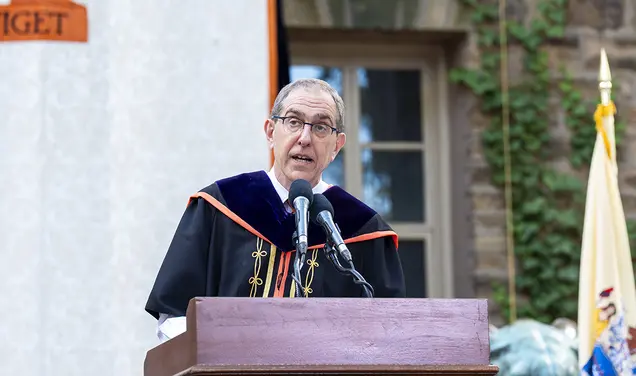Admission rate stirs up students
Princeton has offered admission to 2,150 students as it prepares to enroll its largest freshman class ever — 1,300 students. A record 21,694 students applied for admission, and 9.8 percent were accepted — up from 9.25 percent a year ago (that figure rose to 9.9 percent after 148 students were accepted from the waitlist).
News of the higher acceptance rate set off an angry discussion on the Website of The Daily Princetonian, with more than 200 comments posted within two days. What started as an expression of fear that Princeton’s high position in colleges rankings would plummet became a rant-fest, with students complaining about everything from grade deflation to the senior thesis to “overbearing social regulations.”
But other students took their classmates to task. A poster who identified himself as a senior wrote that the complaints were “not indicative” of his experience and added: “If the grade-deflation policy keeps these grade-grubbing whiners out, then all the better.”
As was the case last year, the admitted students are split about evenly between men and women, and 44.8 percent are U.S. minority students. Legacies account for 10.7 percent of the group. Ten percent are international students. The University also offered 1,331 students positions on the waitlist.
The acceptance rate at most other Ivy schools dropped this year, with Harvard’s rate at 7 percent and Yale’s at 7.5 percent. Dean of Admission Janet Rapelye said the increase in Princeton’s acceptance rate in part reflects the larger class size — up 55 students from this year’s freshman class — as well as the first 20 bridge-year particpants.
The University expects that 59 percent of the students who enroll in the fall will receive financial aid, with an average grant of more than $36,000.











2 Responses
Henry R. Whitehouse ’54
10 Years AgoAdmitting a new class
How can 44.8 percent of those offered admission to Princeton’s Class of 2013 possibly be “U.S. minority students” (Notebook, April 22) out of the total pool of applicants — white, African-American, Hispanic, Native American, and Asian — who all are U.S. citizens?
Hopefully, this is a typo or a misrepresentation of Princeton’s policy of affirmative action. And this was just as the U.S. Supreme Court was hearing oral argument in the case of Ricci v. DeStefano, which involves an action brought against the city of New Haven by 20 white firefighters whose passing grades on a 2003 promotion test were thrown out because no black firemen passed and only one Hispanic had a passing grade. This is blatantly against the 1964 Civil Rights Act, which bans discrimination on the basis of race or sex. If news of the higher acceptance rate and details of such “set off an angry discussion on the Web site of The Daily Princetonian,” surely the alumni/ae of Old Nassau will be weighing in with their thoughts. Let’s hear it for the “fair and balanced” reporting of PAW.
G.A. Howard ’74
10 Years AgoDiversity here to stay
Henry R. Whitehouse ’54 has lamented in at least two missives the same point expressed in “Admitting A New Class” (letters, June 10), which is that he is outraged over the University’s efforts at achieving diversity. I am saddened, but not surprised, that this ersatz fury would come from a man who benefited from a Princeton education because of white male preference afforded him and others back in the “good old days” of Old Nassau. While there is a clumsy attempt in his post to be principled by citing the Civil Rights Act of 1964, the true aim of this gentleman is a return to those good old days when Princeton was populated entirely by white males.
One wonders if this gentleman would have been accepted if he had had to compete against women and minorities. We’ll never know if Mr. Whitehouse was qualified, because he got the benefit of a pre-shrunk applicant pool. Where was his outrage then about what he calls “discrimination” that the University is engaged in today? One would think that a preference-enabled gentleman like Mr. Whitehouse would be humble and grateful that he could attend a top university without having to compete against two-thirds of the population. One would think that, and one would be wrong. The only thing this great education has given this gentleman is a Roman sense of entitlement.
Thank God for diversity, and its power is here to stay. I totally understand why someone who has benefited so much from white male preference would want to cling to it and pray for its return. Fortunately, that prayer will not be answered.